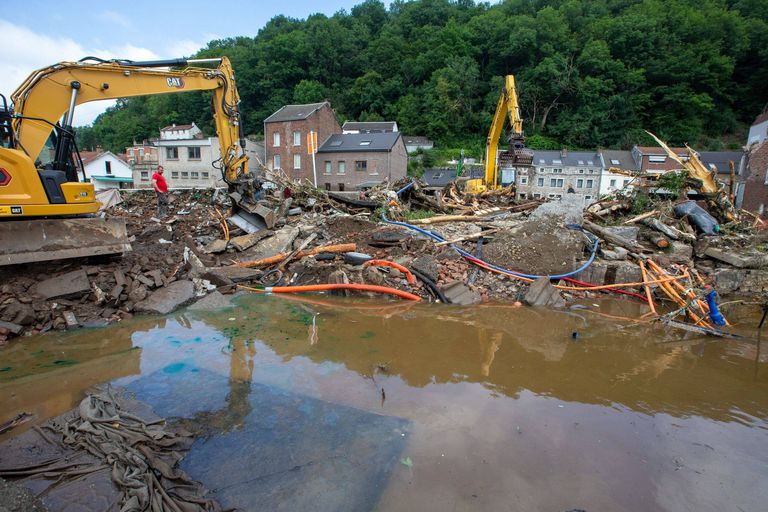The floods in large parts of Belgium at the end of last week were "one of the greatest natural disasters our country has ever known," stated Interior Minister Annelies Verlinden during a press conference on Monday.
As of Monday 19 July, the severe weather has cost the lives of at least 31 people, while 127 others are still "presumed missing or unaccounted for," according to the latest figures by the National Crisis Centre.
"It has now been five days since the storm hit a large part of our country. The water has largely receded, and the havoc is gradually becoming visible," she said. "And that havoc is enormous. This is one of the greatest natural disasters our country has ever known."
"We have to be prepared, but there is no script for a water bomb like the one we just experienced," Verlinden said. "It is an illusion to think that everything can be planned or prepared."
Experts, such as climatologist Jean-Pascal van Ypersele (UCL), are warning that Belgium will see more of these extreme weather phenomena in the future.
By creating a "learning committee," Verlinden said she wants to evaluate the lessons learned from the disaster, to be better prepared for future extreme weather phenomena.
"I am thinking of the deployment of people and equipment of the emergency services, whether evacuations can be planned or not, basic infrastructures such as electricity, water, telecommunications, the provision of European support, and coordination," she said. "We have to learn from disasters like this."
Additionally, Verlinden also stated that the reform of the Civil Protection service - as was decided by the previous federal government - should be reconsidered, and that an evaluation is already underway.
"I will commission a university institution to review the role of the Civil Protection as a specialised second-line service in relation to the reformed fire services," she said.
On Friday, Walloon Minister-President Elio Di Rupo pointed out that the emergency services in and near the disaster area did not have the necessary equipment to help, as the number of Civil Protection stations had been reduced in recent years.
"We want to take every opportunity to look at the reform of Civil Protection in a comprehensive and integrated way," Verlinden said.
Related News
- After floods, Wallonia's railways to resume service line by line
- Three men break through wall to rescue elderly woman from flooding home
- Belgium declares 20 July a 'national day of mourning'
Additionally, the Federal Public Service for Home Affairs called on the Belgian population to hold a minute's silence tomorrow at 12:01 PM on the national day of mourning for the victims of the flood disaster and their loved ones.
The national flag will fly at half-mast and emergency services will sound their sirens, according to Verlinden.
"This is also the time to remember our heroes, such as the aid workers. At the risk of their lives, they saved so many civilians," she said, thanking the fire brigade, Civil Protection, police and Defence.
Verlinden also expressed her gratitude to the aid workers from many European countries who have been working in the disaster areas in recent days. The last team left the country on Sunday.
From now on, police services will concentrate on the structured search for victims in the rubble, according to Commissioner General of the Federal Police Marc De Mesmaeker.
"As of today, dogs from Belgium and the Netherlands are also being deployed," he said. "The search is currently focusing on the places where most victims were found so far: in the Vesdre valley, especially in Pepinster and at a campsite in Esneux."
Where the search will continue in the coming days will be determined later. "We are doing it day by day," said De Mesmaeker, adding that this is "a difficult, atypical mission."
"That is because the current can carry bodies for kilometres, and the water was so powerful that there is a good chance that not just bodies, but also parts of bodies will be found," he added.
This is a huge search area with few clues, according to De Mesmaeker. "There is a large number of potential victims and the places to be searched are potentially very dangerous for the rescue workers."
'Unity makes strength'
According to Director-General of the National Crisis Centre Bart Raeymaekers, after the first phase of the relief effort - including the evacuation and rescue of people in need - the situation in the hard-hit areas is stabilising as access to the site is being restored.
"The objectives in the current phase of the relief effort are locating missing persons, measuring damage to infrastructure and starting initial repairs. This will allow some people to return home," he said.
The official death toll in Belgium now stands at 31, but "we need to be prepared for the still increase in the coming days," Raeymaekers said.
Of the bodies which have been found, 19 of them have now been identified. "54 people are still hospitalised and are 127 presumed missing or unreachable," he said.
The word "presumed" is important, Raeymaekers stressed, as many people lost their phone or do not have electricity to charge it, meaning their relatives cannot reach them.
Additionally, there are still network problems preventing people from contacting others, and some patients were also admitted to hospital without identification.
"The emergency services are busy trying to clarify this as quickly as possible," Raeymaekers added.
"Everyone had hoped for a calmer summer, but unfortunately fate decided otherwise," he said, pointing out that many people, despite their fatigue, have been working very hard for months.
"The worst moments often bring out the best in people," said Raeymaekers. "The many spontaneous expressions of help and support undoubtedly give us the courage to continue and persevere. Unity makes strength."

